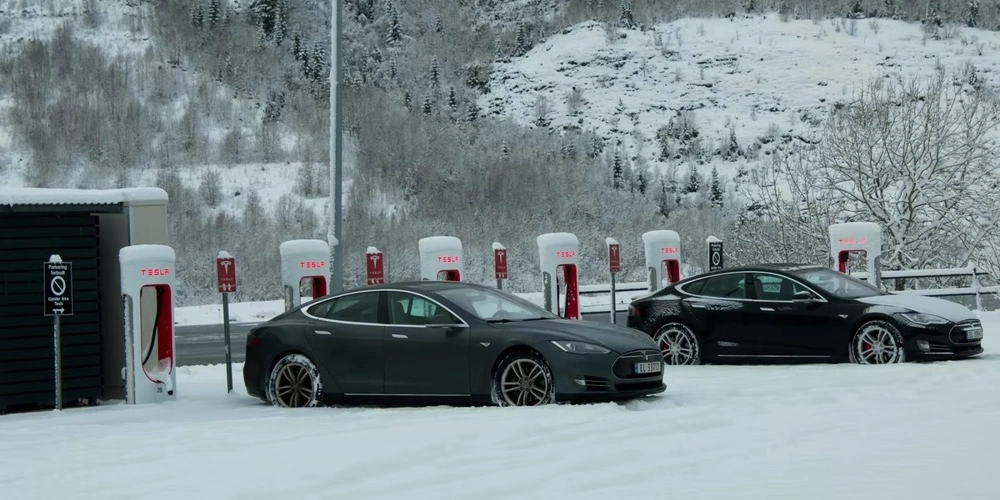Norway, often lauded for its progressive policies, is on the cusp of achieving a groundbreaking milestone in transportation.
The number of battery electric vehicles (BEVs) is set to surpass petrol cars on Norwegian roads by the end of 2024 or early 2025, marking a historic first for any nation.
This shift is propelled by a combination of factors, including generous incentives and Norway’s substantial oil and gas wealth, which have enabled the rapid adoption of electric vehicles.
One of the key drivers of this transition is Norway’s commitment to phasing out the sale of new petrol and diesel cars by 2025.
With nine out of ten new cars sold at the beginning of this year being BEVs, the country is well on its way to achieving this ambitious goal.
This shift is not only reshaping the automotive landscape in Norway but also has significant implications for the global oil market.
The International Energy Agency (IEA) predicts that if more countries follow Norway’s lead, global oil demand could peak earlier than anticipated, with cars and vans accounting for more than 25 per cent of this demand.
Norway‘s transition to electric vehicles has been supported by a range of incentives, including tax exemptions for BEVs and investments in public charging infrastructure.
Despite the impressive growth of BEVs in Norway, there is still a significant gap between the number of BEVs and diesel vehicles on the road.
With almost 370,000 more diesel cars than BEVs, analysts estimate that it will take three to four years for BEVs to overtake diesel vehicles as well.
However, the rapid pace of adoption seen in recent years suggests that Norway’s electric vehicle revolution is well underway.
As the country continues to lead the way in the adoption of electric vehicles, other nations are likely to take note.
The success of Norway’s transition serves as a testament to the power of incentives and policy measures in driving the adoption of sustainable transportation solutions.
With the transportation sector being a major contributor to global emissions, the nation’s example offers a glimpse into a future where electric vehicles play a central role in combating climate change.
8,709 new electric cars in Norway
In March, the country experienced a significant shift in its automotive landscape.
According to the latest data from the Norwegian Road Federation (OFV), there were 8,709 new electric car registrations, marking an increase of 2,062 units compared to February.
However, this figure represents a notable decrease of 8,102 registrations compared to March 2023.
Despite the decline in overall registrations, the electric share of all new car registrations rose to 89.3 per cent, up from 86.8 per cent in March 2023.
This demonstrates the continued dominance of EVs in Norway’s automotive market.
In contrast, the total number of new car registrations across all drive types plummeted from 19,366 in March 2023 to just 9,750 the same month in 2024, a staggering 49.7 per cent decrease.
This decline marks the weakest March performance in 15 years.
Notably, the 9,750 new cars registered in the last month had average CO2 emissions of 12.1 grams per kilometre.
Of the 8,709 new eCars registered, 210 were plug-in hybrids, accounting for a 2.2 per cent market share.
This means that 91.5 per cent of all new registrations in the third month of the year had a charging connection.
However, plug-in hybrids saw a steep decline of 74.9 per cent compared to 2023, indicating a significant loss of market share.
The market share for combustion engine vehicles remained low, with just 76 pure petrol cars and 198 pure diesel vehicles registered.
This represents market shares of 0.8 per cent and 2.0 per cent, respectively.
In the model rankings, the Tesla Model Y continued its dominance with 1,993 new registrations, representing 22.9 per cent of all new electric cars or 20.5 per cent of all new registrations in March.
The Toyota bZ4X followed with 800 registrations, while the VW ID.4 and Volvo EX30 secured third and fourth place, respectively, in the mid-size and compact EV class.
Despite the overall decline in new car registrations, the continued popularity of EVs in Norway indicates a sustained commitment to reducing carbon emissions and transitioning to sustainable transportation options.







